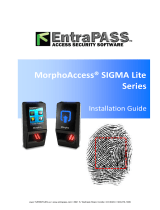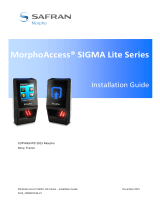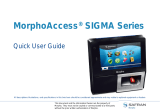Page is loading ...

Version 1.06
English
EN 101.00.BEP2 V1.06A
BioEntry P2
INSTALLATION GUIDE

CONTENTS
Safety instructions 2
Instructional icons 2
Introduction 4
Components 4
Name and function of each part 5
Cables and connectors 6
How to enroll a fingerprint 8
Installation 9
Fixing the bracket and the product 9
Power supply connection 11
Network connection 11
TTL input connection 12
Relay connection 13
Connecting as a standalone 16
Connecting to Secure I/O 2 17
Wiegand connection 18
Resetting Network Settings 19
Restoring the Factory Defaults 19
Product specifications 20
Dimensions 22
FCC compliance information 23
Appendices 24
Disclaimers 24
Copyright notice 24
Open Source License 25
GNU General Public License 25
GNU Lesser General Public License 32
OpenSSL License 34
Original SSLeay License 35

2
Safety instructions
Safety instructions
Please read this safety instructions before you use the product to prevent injury to yourself and others and to prevent
property damage. The term ‘product’ in this manual refers to the product and any items provided with the product.
Instructional icons
Warning: This symbol indicates situations that could result in death or severe injury.
Caution: This symbol indicates situations that may result in moderate injury or property damage.
Note: This symbol indicates notes or additional information.
Warning
Installation
Do not install or repair the product arbitrarily.
• This may result in electric shock, fire, or product damage.
• Damages caused by any modifications or failure to follow installation instructions can void your manufacturer’s
warranty.
Do not install the product in a place with direct sunlight, moisture, dust, soot, or a gas leak.
• This may result in electric shock or fire.
Do not install the product in a location with heat from an electric heater.
• This may result in fire due to overheating.
Install the product in a dry location.
• Humidity and liquids may result in electric shock or product damage.
Do not install the product in a location where it will be affected by radio frequencies.
• This may result in fire or product damage.
Operation
Keep the product dry.
• Humidity and liquids may result in electric shock, fire, or product damage.
Do not use damaged power supply adapters, plugs, or loose electrical sockets.
• Unsecured connections may cause electric shock or fire.
Do not bend or damage the power cord.
• This may result in electric shock or fire.

3
Safety instructions
Caution
Installation
Do not install the product under direct sunlight or UV light.
• This may result in product damage, malfunction, discoloration, or deformation.
Do not install the power supply cable in a location where people pass by.
• This may result in injury or product damage.
Do not install the product near magnetic objects, such as a magnet, TV, monitor (especially CRT), or speaker.
• The product may malfunction.
Keep the minimum distance between products when installing multiple products.
• The product may be affected by radio frequencies emitted by other products and the product may malfunction.
Use the IEC/EN 62368-1 approved power adapter that supports higher power consumption than the product. It is
highly recommended to use the power adapter sold by Suprema.
• If the right power supply is not used, the product may malfunction.
• Refer to the Power in the product specifications for maximum current consumption specifications.
Use a separate power supply for the Secure I/O 2, electric lock, and the product.
• If connecting and using the same power supply, the product may malfunction.
Operation
Do not drop the product or cause impacts to the product.
• The product may malfunction.
Do not disconnect the power supply while upgrading the firmware of the product.
• The product may malfunction.
Do not disclose the password to others and change it regularly.
• This may result in illegal intrusion.
Do not press buttons on the product by force or do not press them with a sharp tool.
• The product may malfunction.
Do not store your product in very hot or very cold places. It is recommended to use your product at
temperatures from -20 °C to 50 °C.
• The product may malfunction.
When cleaning the product, mind the following.
• Wipe the product with a clean and dry towel.
• If you need to sanitize the product, moisten the cloth or the wipe with a proper amount of rubbing alcohol and gently
clean all exposed surfaces including fingerprint sensor. Use rubbing alcohol (containing 70% Isopropyl alcohol) and a
clean, non-abrasive cloth like lens wipe.
• Do not apply liquid directly to the surface of the product.
Do not use the product for anything other than its intended use.
• The product may malfunction.
RTC Battery
Use of an unapproved or incorrect type of battery may result in a risk of explosion. Discard the battery according to the
appropriate regional or international waste regulations.

4
Introduction
Introduction
Components
BioEntry P2 Wall Bracket Drilling Template
Connection Cables Diode 120 Ω Resistor PVC Anchor x2
BioEntry P2
201.00.BEP2 V*.***
Open Source Software
Linux Kernel GPL
glibc LGPL
QT LGPL
OpenSSL
Original SSLeay
306.00 V*.***
A
Fixing Screw x2 Bracket Fixing Screw
(Star Shaped) Quick Guide Open Source Software
Guide
Components may vary according to the installation environment.

5
Introduction
Name and function of each part
Name Description
LED Indicator
Indicates the operational status of the device with the color of the LED.
• Green solid: Authentication success
• Red solid: Authentication failure
• Blue/Sky blue blinking: Normal operation
• Blue/Green blinking: The IP address has not been received properly when using
DHCP
• Blue/Green blinking: When initializing network settings
• Green blinking: Waiting for an input
RF card authentication unit Reads RF cards for entering and exiting.
Fingerprint authentication unit Reads fingerprints placed on it for entering and exiting.
Power supply (2 pins) Connect the power supply cable.
LED Indicator
RF card
authentication unit
Fingerprint
authentication unit
RS-485 (4 pins)
Relay (3 pins)
TTL Input (4 pins)
Ethernet (4 pins)
Wiegand Input/
Output (4 pins)
Power supply (2 pins)

6
Introduction
Relay (3 pins) Connect the relay cable.
Ethernet (4 pins) Connect the Ethernet cable.
RS-485 (4 pins) Connect the RS-485 cable.
TTL Input (4 pins) Connect the TTL input cable.
Wiegand input/output (4 pins) Connect the Wiegand input and output cable.
Cables and connectors
Power supply
1
2
Pin Name Color
1PWR +VDC Red (white stripe)
2PWR GND Black (white stripe)
Relay
1
3
Pin Name Color
1RLY NO White
2RLY COM Blue
3RLY NC Orange
RS-485
1
4
Pin Name Color
1485 TRXP Blue
2485 TRXN Yellow
3485 GND Black
4SH GND Gray

7
Introduction
TTL Input
1
4
Pin Name Color
1TTL IN0 Red
2TTL IN1 Yellow
3TTL GND Black
4SH GND Gray
Wiegand Input or Output
1
4
Pin Name Color
1WG D0 Green
2WG D1 White
3WG GND Black
4SH GND Gray
Ethernet
1
4
8
1
Pin Name Color
1ENET RXN Yellow
2ENET RXP Green
3ENET TXN Red
4ENET TXP Black

8
Introduction
How to enroll a fingerprint
In order to improve the fingerprint authentication rate, register the fingerprint correctly. BioEntry P2 can recognize
a fingerprint even if the angle and position of a user’s fingerprint input change. If you register the fingerprint with
attention to the following matters, the authentication rate can be improved.
Selecting a finger for fingerprint input
• In preparation for the case that the fingerprint of a specific finger cannot be used,
for example if the user is lifting a load with one hand or a finger gets hurt, up to 10
fingerprints for each user can be registered.
• In the case of a user whose fingerprint cannot be recognized well, the authentication
rate can be improved by enrolling the same finger twice repeatedly.
• If a finger has a cut or the fingerprint is blurry, select another finger for the fingerprint.
• It is recommended to use the index finger or the middle finger when scanning the
fingerprint. The authentication rate can be reduced if it is difficult to place another
finger at the center of fingerprint sensor accurately.
Fingerprint enroll method
1
Place the finger with the fingerprint to be registered on the fingerprint authentication unit and press the finger
gently for better authentication.
2
After a beep sounds, scan the fingerprint of the registered finger again. (scan the fingerprint of a finger to be
registered twice)
Cautions for enrolling a fingerprint
When a fingerprint is recognized, it is compared with the initially registered fingerprint, so the initial fingerprint
enroll is the most important. Pay attention to the following matters when enrolling the fingerprint.
• Place the finger deep enough to contact with the sensor completely.
• Place the center of the fingerprint in the center of the sensor.
• If a finger has a cut or the fingerprint is blurry, select another finger for the fingerprint.
• Scan the fingerprint correctly without moving according to the instruction on the screen.
• If you make the finger upright so that the contact area with the sensor is decreased or the angle of finger is
warped, fingerprint authentication may not be performed.
When the fingerprint recognition fails
BioEntry P2 can recognize a fingerprint regardless of a change of season or finger condition. However, the
authentication rate may vary according to the external environment or fingerprint input method.
If the fingerprint authentication cannot be done smoothly, it is recommended to take the following measures.
• If the finger is smeared with water or sweat, dry off the finger and then scan the finger.
• If the finger is too dry, blow your breath on the fingertips and then scan the finger.
• If the finger has a cut, register the fingerprint of another finger.
• The initially enrolled fingerprint often may have not been scanned correctly, so enroll the fingerprint again
according to ‘Cautions for enrolling a fingerprint’.

9
Installation
Installation
Fixing the bracket and the product
1
Determine the correct position to install the bracket using the provided drilling template. Fix the bracket firmly using
fixing screws through the bracket to the position where BioEntry P2 will be installed.
• If installing BioEntry P2 on a concrete wall, drill holes, insert PVC anchors, and fix them with fixing screws.
• To avoid RF interference, a minimum separation distance must be maintained.
Wall thickness
Distance
Wall
Wall thickness Distance
100 mm 250 mm
120 mm 250 mm
150 mm 180 mm
Wall
280 mm

10
Installation
2
Install BioEntry P2 onto the fixed bracket.
3
Connect BioEntry P2 to the bracket by rotating the product fixing screw.
Wall
Wall

11
Installation
Power supply connection
2
1
UPS
(Optional)
BioEntry P2
Power supply connection
1 - PWR +VDC Red (white stripe)
2 - PWR GND Black (white stripe)
DC power
• Use the IEC/EN 62368-1 approved power adapter that supports higher power consumption than the product.
If you wish to connect and use another device to the power supply adapter, you should use an adapter with a
current capacity which is the same or larger than the total power consumption required for the terminal and
another device.
‒Refer to the Power in the product specifications for maximum current consumption specifications.
• DO NOT extend the length of power cable when using the power adapter.
• Use a separate power supply for Secure I/O 2, the electric lock, and the BioEntry P2 respectively. If connecting
and using the power supply to these devices together, the devices may malfunction.
Network connection
TCP/IP
LAN connection (connecting to a hub)
You can connect the product to a hub using a general type CAT-5e cable.
1
81
4
Hub
BioEntry P2
PC

12
Installation
LAN connection (connecting to a PC directly)
BioEntry P2 has an automatic MDI/MDIX function so that it can be connected to a PC directly using a normal straight
type CAT-5e cable, not a cross cable.
1
81
4
BioEntry P2
PC
TTL input connection
1
4
Door button
BioEntry P2
1 - TTL IN0 Red
2 - TTL IN1 Yellow
3 - TTL GND Black
4 - SH GND Gray
Door sensor
Cable shield (optional)

13
Installation
Relay connection
Fail Safe Lock
In order to use the Fail Safe Lock, connect N/C relay as shown in the figure below. There is normally a current flowing
through the relay for the Fail Safe Lock. When the relay is activated, blocking the current flow, the door will open. If the
power supply to the product is cut off due to a power failure or an external factor, the door will open.
1
3
Dead bolt /
Door strike BioEntry P2
2 - RLY COM Blue
3 - RLY NC Orange
DC power
• Install a diode at both sides of the door lock wire as shown in the figure to protect the relay from the reverse
current, which occurs when the door lock operates.
• Take caution of the installation direction of the diode. Install the diode close to the door lock.
• Use a separate power supply for BioEntry P2 and the door lock.
• Suprema’s standalone intelligent readers contain internal relays that can directly lock/unlock doors without
external controllers for added convenience. For access control applications in need of security, however,
it is NOT recommended to use the internal relay of a reader to prevent any tampering attacks which can
potentially trigger the door unlock. For such applications, it is highly recommended to use a separate relay
unit for a lock control such as Suprema’s Secure I/O 2, DM-20 or CoreStation installed at a secure side of a
door.

14
Installation
Fail Secure Lock
In order to use the Fail Secure Lock, connect N/O relay as shown in the figure below There is normally no current flowing
through the relay for the Fail Secure Lock. When the current flow is activated by the relay, the door will open. If the
power supply to the product is cut off due to a power failure or an external factor, the door will lock.
1
3
Dead bolt /
Door strike BioEntry P2
1 - RLY NO White
2 - RLY COM Blue
DC power
• Install a diode at both sides of the door lock wire as shown in the figure to protect the relay from the reverse
current, which occurs when the door lock operates.
• Take caution of the installation direction of the diode. Install the diode close to the door lock.
• Use a separate power supply for BioEntry P2 and the door lock.
• Suprema’s standalone intelligent readers contain internal relays that can directly lock/unlock doors without
external controllers for added convenience. For access control applications in need of security, however,
it is NOT recommended to use the internal relay of a reader to prevent any tampering attacks which can
potentially trigger the door unlock. For such applications, it is highly recommended to use a separate relay
unit for a lock control such as Suprema’s Secure I/O 2, DM-20 or CoreStation installed at a secure side of a
door.

15
Installation
Automatic door connection
1
3
Automatic door
control device
Detection sensor
1 - RLY NO White
2 - RLY COM Blue
Door Button
BioEntry P2
Door lock

16
Installation
Connecting as a standalone
BioEntry P2 can be connected to the door lock, door button, and door sensor directly without connecting a separate I/O
device.
1
3
1
8
1
4
1
4
2 1
DC power
Door sensor
Relay connection
1 - RLY NO White
2 - RLY COM Blue
3 - RLY NC Orange
Door button
• BioEntry P2 can be used as a multi-door controller with the slave devices with the RS485 cable. The slave
devices are used as dummy readers and authentication is performed in the master device.
• If Xpass or XPass 2 is connected to the master device, only card authentication can be used.
• The maximum number of slave devices available to connect varies according to the authentication method,
number of users, and number of devices. Also note that the number of slave devices affects the fingerprint
authentication speed.
• A master device can control 31 slave devices. The bandwidth of RS485 allows for up to 7 fingerprint
authentication devices to be connected.
•
Suprema’s standalone intelligent readers contain internal relays that can directly lock/unlock doors without
external controllers for added convenience. For access control applications in need of security, however, it is
NOT recommended to use the internal relay of a reader to prevent any tampering attacks which can potentially
trigger the door unlock. For such applications, it is highly recommended to use a separate relay unit for a lock
control such as Suprema’s Secure I/O 2, DM-20 or CoreStation installed at a secure side of a door.
• For more information, contact the Suprema technical support team (https://support.supremainc.com).
DC power Dead bolt /
Door strike
BioEntry P2
Power
Relay
Hub
PC
TTL
Cable shield
(optional)
Fail Secure Lock
Fail Safe Lock
or
Power supply connection
1 - PWR +VDC Red (white stripe)
2 - PWR GND Black (White stripe)

17
Installation
Connecting to Secure I/O 2
Secure I/O 2 is an I/O device, can be connected to BioEntry P2 with the RS-485 cable. Security can be maintained even if
the connection between BioEntry P2 and Secure I/O 2 has been lost or the power supply to BioEntry P2 has been shut off
due to external factors.
• Use an AWG24 twisted pair with a maximum length of 1.2 km for the RS-485 cable.
• If connecting with a RS-485 daisy chain, connect the termination resistor (120 Ω) to both ends of the daisy chain
connection. If connected to the middle line, the signal level becomes smaller and the communication performance
will deteriorate. Make sure to connect it to both ends of the daisy chain connection.
2 1
1
81
4
1
4
DC power
Door sensor
Power supply connection
1 - PWR +VDC Red (white stripe)
2 - PWR GND Black (white stripe)
Door button
DC power
Door lock
Secure I/O 2
RS-485
RS-485 connection
1 - 485 TRXP Blue
2 - 485 TRXN Yellow
3 - 485 GND Black
4 - SH GND Gray
BioEntry P2
DC power
PC
Power
Cable shield (optional)
Hub

18
Installation
• BioEntry P2 can be used as a multi-door controller with the slave devices with the RS485 cable. The slave
devices are used as dummy readers and authentication is performed in the master device.
• If Xpass or XPass 2 is connected to the master device, only card authentication can be used.
• The maximum number of slave devices available to connect varies according to the authentication method,
number of users, and number of devices. Also note that the number of slave devices affects the fingerprint
authentication speed.
• A master device can control 31 slave devices. The bandwidth of RS485 allows for up to 7 fingerprint
authentication devices to be connected.
• For more information, contact the Suprema technical support team (https://support.supremainc.com).
Wiegand connection
Use as a Wiegand input/output device.
1
4
RFID reader/
Control device
BioEntry P2
1 - WG D1 Green
2 - WG D1 White
3 - WG GND Black
4 - SH GND Gray
Cable shield (optional)

19
Installation
Resetting Network Settings
1
Turn the power on.
2
Press the network reset button on the rear of device until the device restart automatically.
3
Connect the device with default values.
• TCP/IP address: DHCP address assignment (If DHCP address assignment is failed, 169.254.x.x will be set.)
• Server mode: Disabled
• RS-485: Default, 115200 bps
4
Change the TCP/IP address or RS-485 information.
5
Turn the power off later on and then check the network setting is properly.
Restoring the Factory Defaults
This will delete all data and root certificate on the device and reset the settings.
1
Turn the power on.
2
Press the reset button three times quickly.
3
When the green LED is blinking, press the reset button again.
If there is no root certificate on the device, you cannot restore the factory defaults.
/




